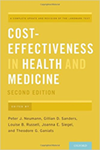
iDSI (International Decision Support Initiative)
In 2013, the Bill & Melinda Gates Foundation (BMGF) asked iDSI and partners to convene a team to develop a reference case [for economic evaluation] that would be available for global development partners, researchers and policy makers around the world. The aim of the reference case was to guide the planning conduct and reporting of economic evaluation so that it can more usefully inform health policy and decision making.
The challenge when developing the Reference Case was that it needed to enable research that could be useful to decision makers at a local, national and international level, and that it would be applicable to different “health technologies” – including individual medicines and diagnostics, public health initiatives and programs and different types of health service delivery. This meant that the Reference Case needed to be different to those used by countries such as England and Thailand, or even by the World Health Organization. To address this challenge the Reference Case adopted a principle-based approach, supporting the fundamentals of economic evaluation but maintaining flexibility for different contexts and technology types.

Guidelines for Benefit-Cost Analysis / Harvard T.H. Chan School of Public Health
This project, funded by the Bill & Melinda Gates Foundation, involves developing guidelines to encourage the conduct of high quality benefit‐cost analyses. These guidelines will provide a reference case that promotes comparability across analyses, and will include principles, methodological specifications, and reporting standards. The guidelines will build on the existing iDSI reference case, which discusses the general framework for economic evaluation and the conduct of cost-effectiveness analyses.
The revised versions of most of our methods papers are now posted here for your review. Please submit your comments via email to this address (bcaguidelines@hsph.harvard.edu) or directly to the authors; if you prefer to submit your comments anonymously, please use our online form. Our next steps involve incorporating the recommendations from the papers into the draft guidance, including any needed changes, and we welcome and appreciate your feedback.
To support this effort, we are soliciting case studies that test and demonstrate the recommendations of the methods papers. We are particularly interested in submissions involving authors who live and work in low- and middle-income countries, to examine the feasibility and usefulness of these recommendations in these contexts. We will use these case studies to illustrate and refine our recommendations, and will feature selected case studies on our website. If you are interested in submitting your case study for consideration, please review the requirements posted here. Completed case studies must be received no later than May 31, 2018.


GEAR (Guide to Health Economic Analysis and Research)
A global platform specializing in helping low- and middle-income countries (LMICs) academics, researchers, and health technology assessment (HTA) practitioners worldwide conduct high quality, policy relevant health economics research. GEAR features include: 1) Mind mapping that provides solutions (long- and short-term) to common and important methodological difficulties; 2) Comparisons of recommendations from selected health economics guidelines, and; 3) “Ask an Expert,” a question-and-answer feature that allows users to pose questions to experts on issues that are not dealt with in the other features of the website.

CEVR (Center for the Evaluation of Value and Risk in Health)/Tufts Medical Center
CEVR analyzes the benefits, risks and costs of strategies to improve health and health care. CEVR undertakes projects to determine the cost-effectiveness of health care interventions, advances methods development, and helps train the next generation of practitioners. We also seek to inform national clinical and public health policy issues. Finally, CEVR has developed and maintains three internationally-known databases that are indispensable resources for health care stakeholders: the Cost-Effectiveness Analysis Registry, the Global Health Cost-Effectiveness Registry and the National Coverage Determinations Database.
CEVR conducts customized analyses for government agencies, private foundations and industry groups. In all our work, we maintain our research independence and freedom to publish.

Second Panel on Cost-Effectiveness in Health and Medicine/ Duke Margolis Center for Health Policy
In a special communication published September 13, 2016 in the Journal of the American Medical Association, the Second Panel on Cost Effectiveness in Health and Medicine updated 20-year-old guidelines and recommendations. The updates build on the original work of the 1996 Panel on Cost-Effectiveness in Health and Medicine, originally convened by the U.S. Public Health Service. They are intended to guide decision-makers in using new methods for analyzing evidence, reporting standardized results, incorporating both health care system and societal perspectives, and weighing ethical issues in the use of cost-effectiveness analysis.
The panel recommendations were presented at a full-day conference at the National Academy of Medicine on December 7, 2016.
Please note that the special communication in the Journal of the American Medical Association and the conference materials are immediately available in the link from the “Second Panel on Cost-Effectiveness in Health” above. The associated book entitled “Cost-Effectiveness in Health and Medicine (2nd Edition: 2016)” is available for purchase or through a participating library.
